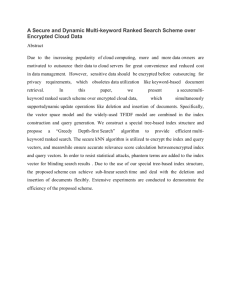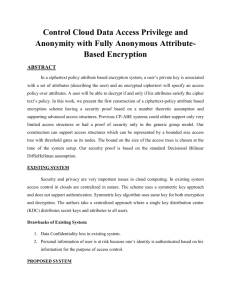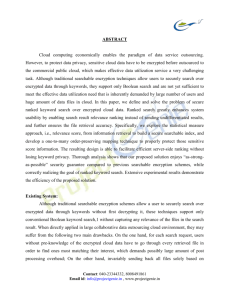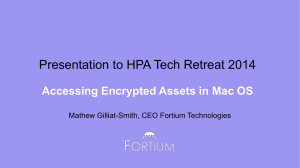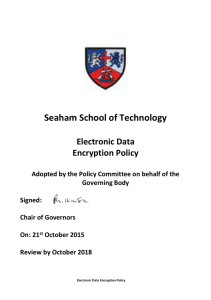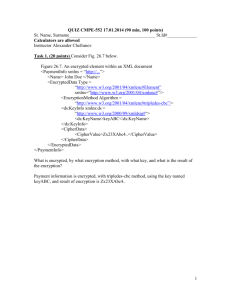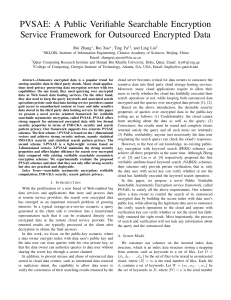Nothing is for Free
advertisement
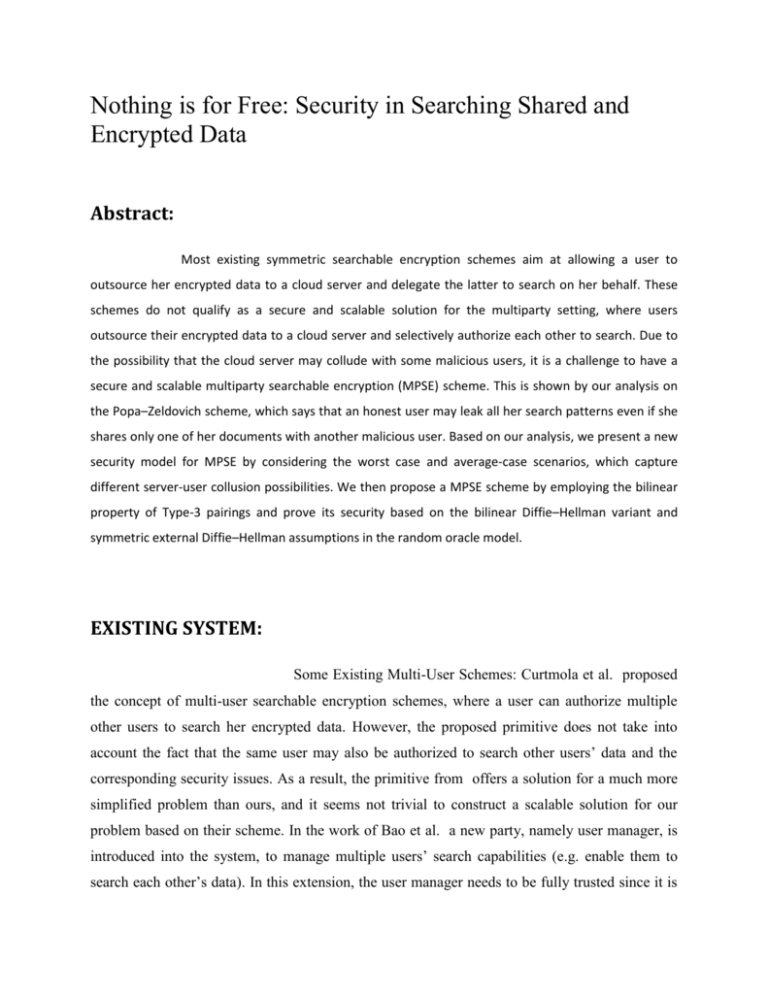
Nothing is for Free: Security in Searching Shared and Encrypted Data Abstract: Most existing symmetric searchable encryption schemes aim at allowing a user to outsource her encrypted data to a cloud server and delegate the latter to search on her behalf. These schemes do not qualify as a secure and scalable solution for the multiparty setting, where users outsource their encrypted data to a cloud server and selectively authorize each other to search. Due to the possibility that the cloud server may collude with some malicious users, it is a challenge to have a secure and scalable multiparty searchable encryption (MPSE) scheme. This is shown by our analysis on the Popa–Zeldovich scheme, which says that an honest user may leak all her search patterns even if she shares only one of her documents with another malicious user. Based on our analysis, we present a new security model for MPSE by considering the worst case and average-case scenarios, which capture different server-user collusion possibilities. We then propose a MPSE scheme by employing the bilinear property of Type-3 pairings and prove its security based on the bilinear Diffie–Hellman variant and symmetric external Diffie–Hellman assumptions in the random oracle model. EXISTING SYSTEM: Some Existing Multi-User Schemes: Curtmola et al. proposed the concept of multi-user searchable encryption schemes, where a user can authorize multiple other users to search her encrypted data. However, the proposed primitive does not take into account the fact that the same user may also be authorized to search other users’ data and the corresponding security issues. As a result, the primitive from offers a solution for a much more simplified problem than ours, and it seems not trivial to construct a scalable solution for our problem based on their scheme. In the work of Bao et al. a new party, namely user manager, is introduced into the system, to manage multiple users’ search capabilities (e.g. enable them to search each other’s data). In this extension, the user manager needs to be fully trusted since it is capable of submitting search queries and decrypting encrypted data.This conflicts with our security criteria (i.e. there should not be additional TTP involved). The schemes of Dong, Russello and Dulay have similar issues. In the work from the above authors have investigated order preserving encryption, where the ciphertexts preserve the order the plaintexts so that every entity can perform an equality comparison. Clearly, these schemes also conflict with our security criteria (i.e. leak minimal information to the server). DISADVANTAGE: In above systems they are not using conditions like denying access to users and account blocking etc. PROPOSED SYSTEM: The concept of searchable encryption provides a promising direction in solving the privacy problem when outsourcing data to the cloud. Such schemes allow users to store their data in encrypted form at an un trusted server, and then delegate the server to search on their behalf by issuing a trapdoor (i.e. encrypted keyword). A detailed survey of searchable encryption schemes can be found. As to the specific setting where multiple users store and share their data with each other in the cloud, we need a new primitive, namely multi-party searchable encryption (MPSE) schemes in the symmetric setting. MPSE can be regarded as a multi-party version of the symmetric searchable encryption proposed by Song et al. Briefly, a MPSE scheme allows every user to build an encrypted index for each of her documents and store it at a cloud server. The index contains a list of encrypted keywords, as well as some authorization information which selectively authorizes other users to search over this index. Our objective is first to formulate MPSE and its security properties and then to provide a scalable and secure construction. To address our problem with any of these schemes, one needs to independently generate a key to protect each document (i.e. instantiate the scheme once for every document) and then shares the key with the users who will be authorized to search this document. ADVANTAGE: Our system more secured by means of Encryption, keys of file, give access to file, retrieve access from file. And also if try to give false password more than 3 times when log in to the account will be deleted. The account will renewed only by the real users. PROBLEM STATEMENT: Due to the private nature of personal data, there is an inherent need for a user to selectively share her data with different recipients. In practice, what a user can do is to set some access control policies and then rely on the cloud server (e.g. Dropbox) to enforce them. Unfortunately, this approach is not realistic due to two reasons. One is that the users have no means to prevent the server from accessing their data. The other is that, even if the server is benign, it may also be forced to share users’ data with other parties SCOPE: We are going to develop the multiparty searchable encryption (MPSE) scheme. Modules : 1. User Login 2. Give Access 3. Retrieve Access 4. Cloud Modules Description User Login: In this module if a user gets logged in, he should give his email id and password. After validating the email id and password from the data base. He can able to login in, Otherwise he won’t. Give Access: After User gets logged in he can view other users who are ready to access his files.User can see the list and give permission to access the file. Following there are two users, A’s file can be accessed by B by taking permission from A, A may or may not access the B’s File. File is uploaded with the following attributes 1.File Key 2.Date 3.File Name etc File will be uploaded in the encrypted form. Retrieve Access: After User gets logged in he can view other users who are ready to access his files.User can see the list and deny access for the user to access the file. Following there are two users, A can deny access to B and vice versa. Cloud: Cloud Service Provide(CSP) see the file list and upload the encrypted files in cloud database along with the owner name of the file, which acts as match word. If A’s file will be uploaded to cloud and A give permission to B, then B can download the file only when the owner of B(i.e A) will get matches with the owner of the(A’s) file in cloud. Users can follow other user and their should be match between them, then only file download will be possible. System Configuration:H/W System Configuration:Processor Speed RAM - Pentium –III - 1.1 GHz - 256 MB (min) Hard Disk - 20 GB Floppy Drive - 1.44 MB Key Board - Standard Windows Keyboard Mouse - Two or Three Button Mouse Monitor - SVGA S/W System Configuration: Operating System :Windows95/98/2000/XP Application Server : Tomcat5.0/6.X Front End : HTML, Java, Jsp Scripts Server side Script Database Database Connectivity : JavaScript. : Java Server Pages. : My sql : JDBC. Literature survey: Literature survey is the most important step in software development process. Before developing the tool it is necessary to determine the time factor, economy n company strength. Once these things r satisfied, ten next steps are to determine which operating system and language can be used for developing the tool. Once the programmers start building the tool the programmers need lot of external support. This support can be obtained from senior programmers, from book or from websites. Before building the system the above consideration are taken into account for developing the proposed system. Conclusion: Motivated by the work by Popa and Zeldovich, we have formulated a new primitive, namely multi-party searchable encryption (MPSE), for enabling users to selectively authorize each other to search in their encrypted data. In the formulation of MPSE, we assume that authorization is granted on index level, namely for each of her indexes Alice can decide whether Bob can search or not (if authorized Bob can try all keywords). It is interesting to have a formulation that supports authorizations on keyword level, namely Alice can authorize Bob to search for a subset of keywords in her indexes.
